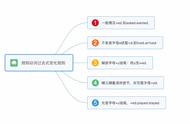过去分词的功能
我们知道英语动词有不定式、一般现在时的单数、现在分词、过去分词、过去式五种形式。

过去分词是动词的一种形式,其往往是动词原形 ed的形式,规则时候一般与过去式一致,如下表。

但有些过去分词形式特殊,与过去式不同,要特别记忆,举例如下表:

过去分词和助动词have、has、had、should have等搭配表示完成时态或某种条件的句子。
He has taken his son to the hospital. (现在完成时)
He took his son to the hospital. (一般过去时)
完成时分为现在完成时,过去完成时,将来完成时。
- 现在完成时 – You’ve met Bill before.
- 过去完成时 – We had already seen the film.
- 将来完成时 – She’ll have finished by 12:00.
再举几个完成时态的例子:
- When I got home my family had already eaten.
- The managers will have seen all the candidates by the end of the day.
- She has taken a day off to do some jobs at home.
- Has he written the report?
过去分词除了用于完成时态以外,还有其它语法功能
过去分词用在被动语态中
- The little girl was bitten by the dog. (girl is the subject)
- The bill was paid by the generous stranger. (bill is the subject)
上面的句子是被动语态,可与下面的主动语态做对比:
- The dog bit the little girl. (dog 是主语)
- The generous stranger paid the bill. (stranger 是主语)
过去分词当形容词做定语,限定名词:
- You should walk cautiously on the frozen pond.
- The exhausted athlete needed take a break and recharge.
- We saw a haunted house on the way to our village.
- The broken glass was all over the floor.
- He was the most hated man in the group.
过去分词可以当形容词,做表语。
我们看几个例子,做表语时都放在be动词之后:
This computer is broken. It doesn’t work.
She was really interested in the presentation.
I was bored, waiting for the bus.
The children are excited about the party.
Young graduates are motivated to work hard.
We were very surprised to hear the news.
He was tired after the match.
His leg was swollen by the time he returned home.
过去分词做状语表示原因,方式等:
过去分词所形成的短语可以做状语,
Driven by ambition, Derek worked up to 14 hours a day.
Exhausted from the marathon, the runner collapsed onto the ground.
Illuminated by multi-colored lights, the skyscraper looked incredible.
过去分词的Having done结构,表示某种先于主句的动作:
- Having read your book, I now understand your position.
- Having signed the document, Jason felt the weight of responsibility lift from his shoulders.
- Having taken the antimalarial tablets religiously, Sarah was shocked by the malaria diagnosis.
- Having finished the work on time, Jon went out for a walk.
- Having been accused of the thievery, Max left the company
- Having worked for the entire day, she was tired.
- Having heard the news of his accident, we decided to take the day off and see him.
- Having seen the horror movie alone, she could not sleep.
- Having paid the fine, I got my licence back.
- Having eaten so much already, he refused to come to the party and have dinner with us.
- He was arrested last night from his farm house, having killed one of his teammates.
- My friend Alex decided to retire and spend his remaining life in his village, having achieved everything he wanted.
但这种结构必须注意分词短语的逻辑主语必须与后面的主句的主语是一致的。
Overcome by emotion, the whole speech was delivered in two- and three-word bursts.

上述句子错误的原因,the whole speech与过去分词结构的逻辑主语不一致。
Overcome by emotion, he delivered the whole speech in two- and three-word bursts.

分词结构用在被动语态做状语,但其宾语必须与主句的主语一致:
例如:
- Having been given the day off, we decided the explore all the famous places in the city.
- Having been selected for the trip to London, I was ecstatic and thanked god for the opportunity.
- Having been bullied multiple times, he decided to learn self-defence.
- Having been kept in the fridge, the pizza got cold and soggy.
- She, having been praised for her work, felt happy and got everyone a chocolate.
- We called some of our friends to let us spend the night at their place, having been forced to vacant the flat.
- Having been advised to work on my body, I bought some gym equipment and started working out on my terrace.
- Not having studied well, we failed the exams.
- Not having been respected for his work, Jolie left the company and started his own business.
- Not having watched the movie before, I went out to see the movie with my friends.















